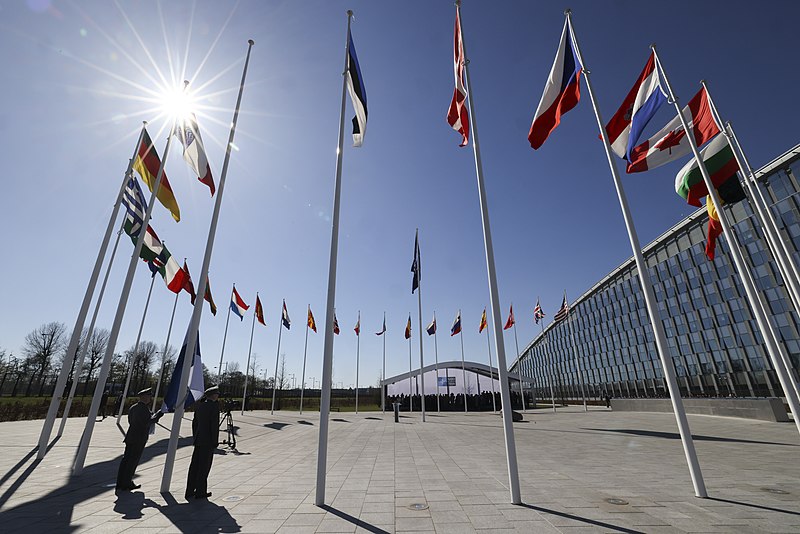The North Atlantic Treaty Organization is reportedly set to open an office in Japan, the first such office by the alliance in the region. The NATO office would oversee Indo-Pacific consultations in light of regional tensions.
According to Nikkei Asia on Wednesday, NATO will be opening a liaison office in Japan, the first in Asia, to facilitate consultations on the Indo-Pacific, according to NATO and Japanese officials familiar with the matter. The proposed office is expected to open in 2024, but there have yet to be details on whether Tokyo would provide the space or if NATO would fund the liaison office.
The liaison office will provide an opportunity for discussions with the alliance’s security partners, including South Korea, Australia, and New Zealand. The alliance has similar offices in New York, Ukraine, and Vienna, among others.
NATO spokesperson Oana Lungescu said that NATO would not go into detail about the ongoing discussions when pressed on the report.
“NATO has offices and liaison arrangements with a number of international organizations and partner countries, and allies regularly assess those liaison arrangements to ensure that they best serve the needs of NATO and our partners,” said Lungescu, adding that the alliance has a partnership with Japan that continues to grow.
“Practical cooperation includes a wide range of areas, including cyber defense, maritime security, humanitarian assistance and disaster relief, non-proliferation, science and technology, and human security,” said Lungescu.
NATO chief Jens Stoltenberg visited Japan back in January, pledging to Prime Minister Fumio Kishida to strengthen ties at a time of “historic” security challenges such as Russia’s invasion of Ukraine and China’s increasing military expansionism. This also comes as Japan and NATO are looking to deepen cooperation on cyber threats, disruptive technologies, and disinformation.
On Wednesday, the alliance’s intelligence chief warned that Russia may look to damage undersea cables as a way of punishing the West for supporting Ukraine as NATO looks to protect its undersea infrastructure following the Nord Stream pipeline attacks. NATO intelligence chief David Cattler told reporters that Moscow may target undersea cables and other such infrastructure to “disrupt Western life, to gain leverage against those nations that are providing security to Ukraine.”
Cattler cited the sudden increased activity by Russia in this aspect, patrolling the Atlantic now more than before while increasing military activities in the North and Baltic Seas.



 U.S.-India Trade Framework Signals Major Shift in Tariffs, Energy, and Supply Chains
U.S.-India Trade Framework Signals Major Shift in Tariffs, Energy, and Supply Chains  India–U.S. Interim Trade Pact Cuts Auto Tariffs but Leaves Tesla Out
India–U.S. Interim Trade Pact Cuts Auto Tariffs but Leaves Tesla Out  Trump Signs Executive Order Threatening 25% Tariffs on Countries Trading With Iran
Trump Signs Executive Order Threatening 25% Tariffs on Countries Trading With Iran  Federal Judge Restores Funding for Gateway Rail Tunnel Project
Federal Judge Restores Funding for Gateway Rail Tunnel Project  Trump Lifts 25% Tariff on Indian Goods in Strategic U.S.–India Trade and Energy Deal
Trump Lifts 25% Tariff on Indian Goods in Strategic U.S.–India Trade and Energy Deal  Trump’s Inflation Claims Clash With Voters’ Cost-of-Living Reality
Trump’s Inflation Claims Clash With Voters’ Cost-of-Living Reality  Trump Signs “America First Arms Transfer Strategy” to Prioritize U.S. Weapons Sales
Trump Signs “America First Arms Transfer Strategy” to Prioritize U.S. Weapons Sales  U.S. to Begin Paying UN Dues as Financial Crisis Spurs Push for Reforms
U.S. to Begin Paying UN Dues as Financial Crisis Spurs Push for Reforms  New York Legalizes Medical Aid in Dying for Terminally Ill Patients
New York Legalizes Medical Aid in Dying for Terminally Ill Patients  China Warns US Arms Sales to Taiwan Could Disrupt Trump’s Planned Visit
China Warns US Arms Sales to Taiwan Could Disrupt Trump’s Planned Visit  Trump Allows Commercial Fishing in Protected New England Waters
Trump Allows Commercial Fishing in Protected New England Waters  U.S. Lawmakers to Review Unredacted Jeffrey Epstein DOJ Files Starting Monday
U.S. Lawmakers to Review Unredacted Jeffrey Epstein DOJ Files Starting Monday  TrumpRx.gov Highlights GLP-1 Drug Discounts but Offers Limited Savings for Most Americans
TrumpRx.gov Highlights GLP-1 Drug Discounts but Offers Limited Savings for Most Americans  Nighttime Shelling Causes Serious Damage in Russia’s Belgorod Region Near Ukraine Border
Nighttime Shelling Causes Serious Damage in Russia’s Belgorod Region Near Ukraine Border  Pentagon Ends Military Education Programs With Harvard University
Pentagon Ends Military Education Programs With Harvard University  Ohio Man Indicted for Alleged Threat Against Vice President JD Vance, Faces Additional Federal Charges
Ohio Man Indicted for Alleged Threat Against Vice President JD Vance, Faces Additional Federal Charges 































